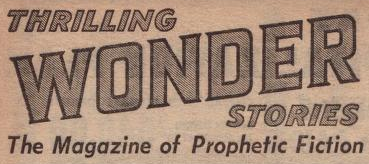Miracle Town by William F. Temple appeared in the October 1948 issue of Thrilling Wonder Stories.
Miracle Town gives off the sort of vibe you get from those more whimsical episodes of the Twilight Zone. It uses some scientific jargon and philosophy to fuel its magical and miraculous narrative; the implausible science (which is actually hard science with a REALLY BIG and implausible “What If?”) allows the story to dig into the science egg-head skeptic character’s reactions to everything in a way which simply would not work if it were pure magic which the story revolved around.
There are four major characters:
- A big city newspaper man who has decided he can’t hack it in the big city and so returned to his hometown to write and manage the local rag, but isn’t having any luck there either.
- A skeptical man, the newspaper man’s relative, who is obsessed with science and always has his nose buried in a book; nothing happens that cannot be explained by hard science.
- A strange hobo/self-proclaimed physics professor who shows up along with a maelstrom of bizarre happenstance, trickery, and hijinks; he promises that all will be made clear.
- The town itself, which is dusty and boring, where nothing really exciting or interesting ever happens – it is Good in its simplicity. The folks who live there are simple and have simple wants.
In said town in which nothing interesting happens, the strange old man cackles as he seemingly causes all manner of chaos, ranging from drinks that never empty to the chaste statue in the town square shedding her garments to pose provocatively. After having all sorts of good-natured fun at the expense of the townfolk, the strange professor explains that it’s all due to the nature of atoms. See, all things are made out of atoms; why, if atoms decided to up and move, they could change the shape, location, and even basic makeup of material objects on a whim. And whim and whimsy do they have, for sub-atomic particles are just like you and me, only unbelievable small! They even wed, forming unions! When they marry, they form atoms; when they congregate and socialize, they may form larger atoms, large enough that some might become unstable. And they coordinate intelligently to form all matter as we know it. And once in a blue moon, they may make contact with the human world, sending an envoy into their midst (the professor), and will grant wishes to make folks happiness, because the particles want folks to be happy, as happiness is the most important thing in the universe.
The simple townsfolk wish for simple things, often things that will benefit the ones they love. Only the newsman thinks of money; his wish ends up being a Midas touch, which also wrecks a lot of the skeptic’s books and records as the atoms comprising them transform into solid gold. The skeptic is able to use his wish to transmogrify his own stuff back the way it was. The story’s twist comes as the newspaperman sits on his uncomfortable solid gold chair, surrounded by solid gold furniture, feeling like a heel as he finds out about small but touching things the folks he’d looked down on as rubes had wished for; the skeptic tells him that dang near no one in the town actually knows how to read, he’d just never bothered to mention it before, but that could very well be why the local rag is failing. The newspaper man decides to help his hometown out, selling his gold furniture and using the money to start a school.
I wish I had a better way to describe the way this story felt than “good stories for good folks”, even with a few little fun naughty winks (folks running up to throw a sheet over the statue that had disrobed); it’s “goodness” was in such contrast to both Burks’ story before it and Bradbury’s after it, but it didn’t feel overly saccharine despite its sentimentality. It maybe came close, your mileage may vary, but I thought it worked well as a palate cleanser after Burks’ deep thinks on past lives and the doom of Atlantis.
Plus, it had a great line where the skeptic says ‘Offense cannot be given… one can only choose to be offended… and I CHOOSE to be offended!’
Can you imagine a story like this being written today?
More and more I’m beginning to think that pulp isn’t a style or a genre – it’s a mindset. To write or enjoy pulp, you have to ignore 50 years of devolution and think like a mid-century middle American. You have to love virtue, appreciate classy gals, and think like a hopeful Christian.
“The simple townsfolk wish for simple things, often things that will benefit the ones they love.”
Virtue found in those uncomplexed by the vices of high thought and high culture and those complexed being wrecked for their lack.
Bet I could find a few examples of that in the works of ERB and REH.
Note: dang I wanted to take a jab at Asimov.
It was Bradbury not Asimov according to isfdb.
“86 • Miracle Town • novelette by William F. Temple
86 • Miracle Town • interior artwork by uncredited
101 • The Square Pegs • short story by Ray Bradbury”
http://www.isfdb.org/cgi-bin/pl.cgi?61753
-
Dang, I screwed up! I’ll fix this one when I get to a compy where I’ve got my password saved.
I’m going to find this to read before returning to this post as I like the concept. I stopped reading as I want to find out what the old hobo is promising the town and the outcome w/o any type of spoiler. Good find